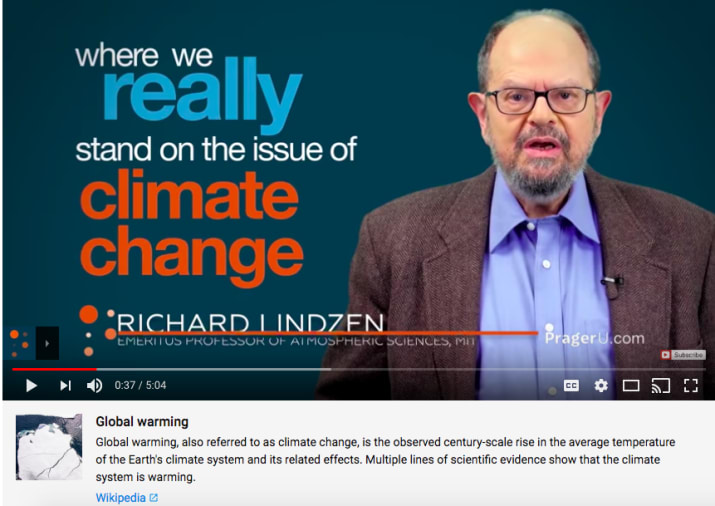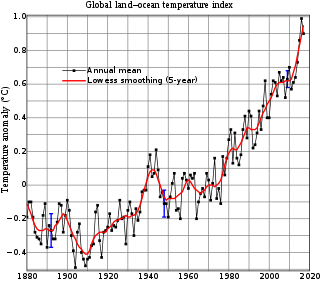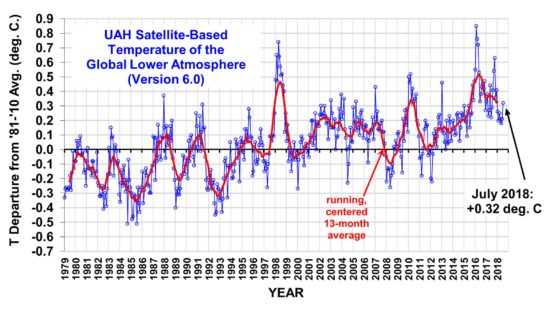How Do You Tell If The Earth's Climate System "Is Warming"?
The earth's climate
system "is warming." True or false? The answer is that there is no
definitive answer. And if someone tells you there is, then that person
doesn't know what he or she is talking about.
A more precise answer
to the question is that whether the earth's climate system "is warming"
or "is cooling" entirely depends on who gets to pick the start date for
the analysis. If you are the one who gets to pick the start date, then
you can make it so that the system is either warming or cooling,
whichever you would like for your purpose of the moment.
But of course, there
are many people out there today with a lot invested in the proposition
that the climate system "is warming." That proposition is a key tenet
of global warming alarmism. To "prove" the point that the system "is
warming," advocates use the simple trick of picking a start point to
their liking, making for a presentation that appears to support their
position. Have you been fooled by this simple trick? The advocates
leave it up to you to figure out that if you picked a different start
point, you could just as easily make an equally convincing presentation
showing that the climate system "is cooling." A lot of seemingly
intelligent people can't figure that out, and get taken in by the scam.
I raise this point
today because it appears that, as part of the campaign to suppress
disfavored political speech, Google has begun within the past few days
adding a legend at the bottom of YouTube videos that express politically
incorrect views in the field of climate science. For example, here is
the legend that they have added to a video made for Prager University by
eminent MIT atmospheric physicist and climate skeptic Richard Lindzen:

"Multiple lines of scientific evidence show that the climate system is warming."
The quote comes from the first two sentences of this Wikipedia entry with the title "Global warming." Well, Wikipedia says it, so I guess it must be true!
According to this post at BuzzFeed on August 7, others who have been subject to having the same legend affixed to their work include Tony Heller of the Deplorable Climate Science Blog, Mark Morano of Climate Depot, and the Heartland Institute. (So far, nothing comparable has happened to the Manhattan Contrarian; but then, I don't make YouTube videos.)
So let's investigate
the question of whether the earth's "climate system" is or is not
warming. You could, for example, look at the chart presented by
Wikipedia in that entry. Here it is:

That looks rather
dramatic. On the other hand, the whole vertical scale of the chart is
only about 1.5 deg C; and they picked 1880 as their start date. (The
slope here is also greatly accentuated by some very large and
questionable "adjustments" that have made earlier years cooler and more
recent years warmer. You can read my eighteen part series "The Greatest Scientific Fraud Of All Time" for much more detail. But those details are not critical for understanding the current issue.)
Does your skeptical
mind possibly think, when they use that phrase "century scale," is that
just a bias-free description of the issue at hand, or is it instead a
hand-wave to provide a fake justification for picking a preferred start
date? Why do we need to go back 138 years when we are considering a
question phrased in the present tense -- whether the climate "is" warming?
Wouldn't the present tense normally be used to cover a much shorter
period, like a year or two or three at most? So you ask, what has the
climate system been doing during that time? For the answer, how about looking for temperature data to the far more accurate UAH satellite-based serieswhich provides monthly data points going back to 1979. Here is the latest chart from that source:

This time, you get to
pick the start date. To cover the last few years, how about picking
early 2016? After all, these last couple of years should be a much
better indicator of whether the climate "is" warming or cooling than the
entire last 138 years. Really, what do temperatures more than 100
years ago, or even 30 or 40 years ago, have to do with the question of
whether the earth's climate "is" warming? So we look at the UAH chart,
and we find our answer: since early 2016 temperatures have fallen by
more than 0.5 deg C. Thus, once we get to pick our preferred start
time, it is obvious that the climate system "is cooling."
Or, you can pick a
different start date to your liking. How about 1998? That will give
you an entire 20 year run. It's hard to say that the verb "is" should
cover a period of more than 20 years. On the UAH series you can see
that temperatures have also fallen about
0.4 deg C since early 1998. Again, even on this substantially longer
scale, the earth "is cooling." (Note, however, that there is a
significant difference between the Wikipedia chart and the UAH satellite
series as to what has happened since 1998. On the Wikipedia chart the
latest reading (2017?) is up about 0.3 deg C from 1998; while on the UAH series, the latest reading (July 2018) is down about
0.4 deg C from the then-records set in 1998. That's those
"adjustments" in the surface temperature record that I was talking
about. I would say that there is no credible position that the heavily
adjusted surface temperature record that Wikipedia relies on should be
used for this purpose over the far more accurate and un-tampered UAH
satellite record.)
But how about if we
decide that there is something to this "century-scale" thing? Let's
agree that we're going to go back many, many decades to determine if the
earth "is warming." But if we're going to do that, where do we stop?
If you want, you can go back a hundred million years; or even a
billion. And if you follow this subject a little, you probably know
that the 1700s and 1800s are a very suspect era to start a series like
this, because those centuries are a known cold period sometimes referred
to as the "Little Ice Age." Picking a date in the "Little Ice Age" as
the start point to prove warming is what's called "cheating." Let's
pick something more fair. How about going back a nice round millennium?
Was that time warmer or cooler than now?
OK, they didn't have
networks of thermometers set up around the globe in the 11th century,
let alone the highly accurate satellites that we have today. But scores
of scientists have done hundreds of studies based on many sorts of
"proxies" to determine at least whether it was warmer or cooler at that
time than today. It turns out that the evidence is rather overwhelming
that it was warmer. Actually, this is what is known as the "Medieval
Warm Period." But picking a date in that period as your start date for
deciding whether the earth "is warming" is no more fair or unfair than
picking a date in the "Little Ice Age."
Here is a compilation of dozens of studies reaching the conclusion that the Medieval Warm Period was warmer than the present: "More
than 700 scientists from 400 institutions in 40 countries have
contributed peer-reviewed papers providing evidence that the Medieval
Warm Period was real, global, & warmer than the present." Examples:
- "Paper finds Medieval Warm Period in Arctic was much warmer than the present."
- "Medieval Warming Exceeds Modern Warming, Per New Research Using 120 Proxies."
- "Earth was warmer in Roman and Medieval Times say German researchers."
There are literally
dozens more, if you follow the links. The conclusion is inescapable: on
a centuries-scale basis, the earth's climate system "is cooling."
And by the way, if
you want to keep going back farther and farther, you can keep finding
time periods that were warmer than the present. Examples: the Roman Warm Period, from around 250 BC to 450 AD; and the Holocene Climate Optimum, about 5000 to 3000 BC.
So here's the real answer to the question of whether the earth's ciimate system "is warming":
- If your start date is June 2018, it "is warming."
- If your start date is January 2016, it "is cooling."
- If your start date is January 1998, it "is cooling."
- If your start date is 1880, it "is warming."
- If your start date is the year 1000, it "is cooling."
- If your start date is the Dark Ages, it "is warming."
- If your start date is Roman times, it "is cooling."
In short, the question is completely meaningless.
It's hard to believe
that the supposed geniuses at Google could be taken in by a scam so
obvious and so transparent.
But that's the world we live in.
No comments:
Post a Comment